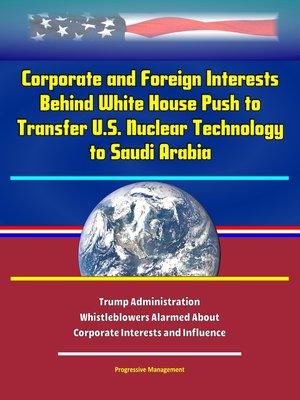Corporate and Foreign Interests Behind White House Push to Transfer U.S. Nuclear Technology to Saudi Arabia
ebook ∣ Trump Administration Whistleblowers Alarmed About Corporate Interests and Influence

Sign up to save your library
With an OverDrive account, you can save your favorite libraries for at-a-glance information about availability. Find out more about OverDrive accounts.
Find this title in Libby, the library reading app by OverDrive.



Search for a digital library with this title
Title found at these libraries:
| Loading... |
On February 19, 2019, the Committee on Oversight and Reform issued an interim staff report prepared for Chairman Elijah E. Cummings after multiple whistleblowers came forward to warn about efforts inside the White House to rush the transfer of U.S. nuclear technology to Saudi Arabia. As explained in the first interim staff report, under Section 123 of the Atomic Energy Act, the United States may not transfer nuclear technology to a foreign country without the approval of Congress in order to ensure that the agreement meets nine nonproliferation requirements to prevent the spread of nuclear weapons. These agreements, commonly known as "123 Agreements," are typically negotiated with career experts at the National Security Council (NSC) and the Departments of State, Defense, and Energy.
The "Gold Standard" for 123 Agreements is a commitment by the foreign country not to enrich or re-process nuclear fuel and not to engage in activities linked to the risk of nuclear proliferation. During the Obama Administration, Saudi Arabia refused to agree to the Gold Standard. During the Trump Administration, Saudi Crown Prince Mohammed bin Salman (MBS) went further, proclaiming: "Without a doubt, if Iran developed a nuclear bomb, we will follow suit as soon as possible." There is strong bipartisan opposition to abandoning the "Gold Standard" for Saudi Arabia in any future 123 Agreement.
This report—the Committee's second interim staff report on this issue—is based on more than 60,000 pages of new documents obtained by the Committee since it issued its first interim staff report in February. These documents have been produced in response to requests that Chairman Cummings made to a host of outside companies about their involvement with these efforts. Overall, the new documents obtained by the Committee reveal that, with regard to Saudi Arabia, the Trump Administration has virtually obliterated the lines normally separating government policymaking from corporate and foreign interests. The documents show the Administration's willingness to let private parties with close ties to the President wield outsized influence over U.S. policy towards Saudi Arabia. These new documents raise serious questions about whether the White House is willing to place the potential profits of the President's friends above the national security of the American people and the universal objective of preventing the spread of nuclear weapons. New documents obtained by the Committee reveal that contacts between private commercial interests and high-level Trump Administration officials were more frequent, wide-ranging, and influential than previously known—and continue to the present day.
This compilation includes a reproduction of the 2019 Worldwide Threat Assessment of the U.S. Intelligence Community.






